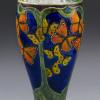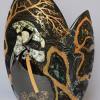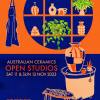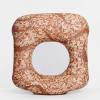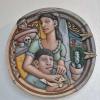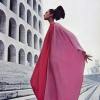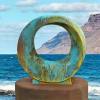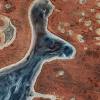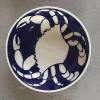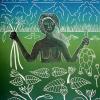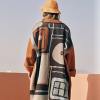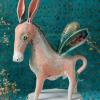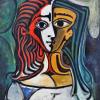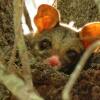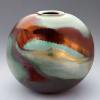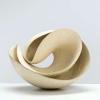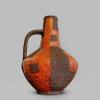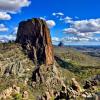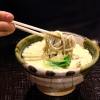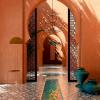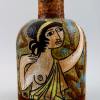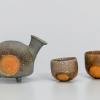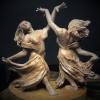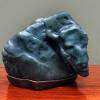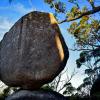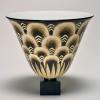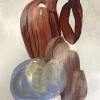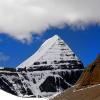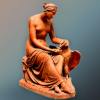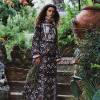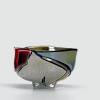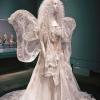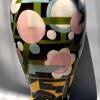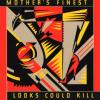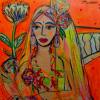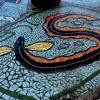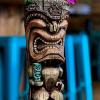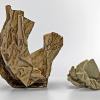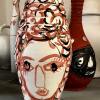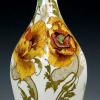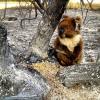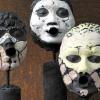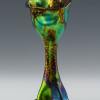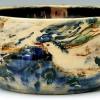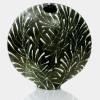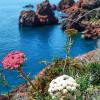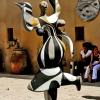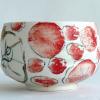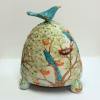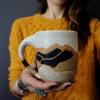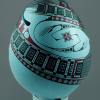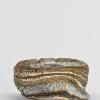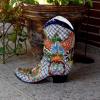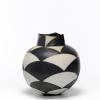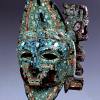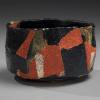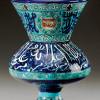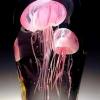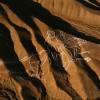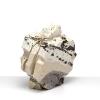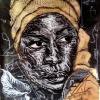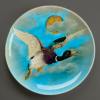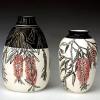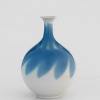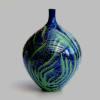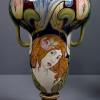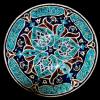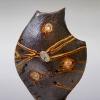Sculptures, pottery and arts of PNG

Ancient pre contact, wood carved Janus ancestral figure from central Abelam area, Kalabu Village
As with most primitive traditional aesthetics, the art of Papua New Guinea is closely connected to their culture. Due to the diversity of languages (more then 700) and regions in PNG , the different tribes all have uniquely styled, identifiable art. Their artifacts being distinguished by features such as clan totems, clan symbols, deities, animals and ancestor spirits. The colours and themes depend on the individual artist, the availability of materials, local traditions as well as the unique styles of the different villages. They often refer directly or indirectly to ancestor or clan spirits and totems such as the cassowary (muruk), pig (pik), crocodile (pukpuk), eagle (taragau), or a water and bush bird (saun).
Most of the handmade tribal art takes the form of carvings, statues, masks, costumes and adornments used in religious ceremonies, or more functional objects such as bowls, pottery, canoes, baskets, weapons and bilums (string bags). Shields have a performance, decorative and spiritual role which is of more importance then their defensive purposes. Musical instruments like kudus, flutes and mouth organs, are common in the Highlands, while the Trobriand Islanders are famous for their elaborate carvings, including stylised figures, carved ebony walking sticks and fish bowls inlaid with mother-of-pearl. In northern New Ireland, a feature of the Malangan culture are the figurines carved for village burial ceremonies, while in Gulf Province, carved spirit boards are believed to contain the spirits of great heroes and warriors.
The people in the villages along the Sepik River (the longest in PNG) and its tributaries are the most active carvers in New Guinea and are renown for their art and craftsmanship. Both the men and women of the Sepik tribes use expressionistic styles to convert figures of spirits and dreams into carvings and other crafts. Storyboards are used to illustrate village history, their ornate relief carvings capturing tales of village life that were once painted on bark.
Angoram ancestor figure mask, Sepik River
With most of the tribal art of Oceania, the carvings are created to be vehicles of their spirits. They are intended both to help the people meet the challenges of everyday life and to ward off the influences of unfriendly spirits. Decoration using undulating, curvilinear lines is also common along with vivid colours made from natural pigments (limes and ochres) that result in striking imagery. Few masks are worn directly over the face, which explains the lack of holes for eyes. Some are fastened onto a large cone-shaped wicker framework for a dance costume called a tumbuan. Others are displayed outside the men’s house or inside the spirit houses or other dwellings to ward of evil spirits or to evoke the power of ancestors at the specific location.
The village spirit houses, known as Haus Tambaran’s, are where a fantastic array of carvings including masks, statues and figures are kept, and traditionally are only accessible to the local warriors. On an annual or regular basis, community ‘Sing Sings’ occur, which are a gathering where different tribes meet to display their unique identity through elaborate costumes, dance and music. New tribes and art are still being discovered in the remote parts of New Guinea and due to its diversity, I’m looking forward to seeing what appears.

Asmat Shield, Unir (Lorenz) River, Irian Jaya
Sotheby’s

‘Damarau’ clay pottery made by the women in Aibom Village on the Sepik River
Papua New Guinea

Polished stone wedding gift – Trobriand Islands
The islands are coral atolls, and anything of stone is considered rare and valuable.
Photo Eric Lafforgue.

Unglazed earthenware cooking pot (gun), Bosman peoples, Ramu River
Madang Province, Papua New Guinea

Papua New Guinea — Oceania Mask Art

Angoram carved mask – Sepik River

Dusky Lory Parrot, New Guinea

Clay pot for smoking fish – Keram River location
Papua New Guinea

Damarau or Sago Storage Vessel

Carved clay ‘Kamana’ (cooking vessel) – Sawos people
Papua New Guinea

Figural Head Dress – New Britain, Sulka People
circa 1880, Papua New Guinea
LACMA

Crocodile cult dancers – Yentchen Sepik

Damarau sago strorage vessel

Hulis tribe girls at Mount Hagen festival ‘sing sing’

Iatmul hook – Sepik River, PNG
Elaborate hooks are often described by anthropologists and collectors as cult hooks, food hooks or suspension hooks. They are carved and decorated to accommodate benevolent spirits and to preserve food. Suspending food from the hook discourages vermin, and the spirit thought to inhabit the hook is believed to retard spoilage.

Geometrically carved clay pot – Madang Province, PNG

Kanganaman Village wood carved statue—East Sepik Province—Papua New Guinea

Hand painted mask – Kanganaman Village
East Sepik Province – Papua New Guinea
Flickr – Rita Willaert

Kwams–eating bowl with figural relief art – Naimi, Papua New Guinea
Flickr–Ant Ware

Wood carved hook – New Guinea

Dream Face Mask, Papua New Guinea

Anthropomorphic Figure, Melanesia, Urama and Era River groups, Papua New Guinea
Musée Barbier-Mueller

Ceramic Sago Pot – Iatmul peoples
Sepik River

Decorated gourd Lime Pot
Trobriand Islands

Hand carved chief’s throne – Madang, PNG

Relief decoration cooking pot – PNG
Mary Cotterman – flickr

Masked dancers in front of the men’s longhouse at Tovei village
Frank Hurley, 1921, Australian Museum.

Red Mask
Murik Watam, PNG, Sepik Province
The Barbier Mueller Museum

Abelam clay pot with spirit-face mid-20th century
Michael Hamson Oceanic Art

Madang province clay pot
20th century
![hunters-helper-figure-new-guinea National-Gallery-Australia-Korewori-Caves-region-Hunter's-helper-figure-[aripa]](https://www.veniceclayartists.com/wp-content/uploads/2016/06/National-Gallery-Australia-Korewori-Caves-region-Hunters-helper-figure-aripa-c.jpg)
‘Aripa’ – Hunter’s helper figure
Korewori Caves region, PNG
National Gallery Australia

Orator stool
Orator stools are carved wooden artefacts, unique to PNG. They are symbolic statues of an ancestral or spirit figure who is sitting on this stool. The figure represents an ethereal convenor or “chairman” of meetings in Sepik men’s houses. During meetings and gatherings, speakers tap or slap the orator statue to give authority to their words. This orator stool is carved out of a single piece of timber and is rich in detail. The main ancestor figure has big powerful savi eyes and sticks its tongue out to ward off evil spirits.
Ngtt.com.au

Nagum Boiken clay pot
20th century

Wall art tribal mask – PNG

Tribal masks in Port Moresby, Papua New Guinea

Carved canoe splashboard, Trobriand Islands, PNG

Fish smoking clay pot, Dimeri Village
Lower Sepik River, New Guinea,

Female spirit figure sculpture

Yam Spirit pottery head- Washuk Region
Papua New Guinea

Huli wigmen

Wood carved female statue – Melpa tribe
Rondon Ridge, PNG

Huli Wigmen in tribal costumes designed to resemble the Raggiana Bird of Paradise

Tribal masks – Palambei Village -East Sepik Province
Papua New Guinea

Bowl with incised decoration – Papua New Guinea

Incised decorative face pot – PNG

Women dancing in the Purari Delta,Gulf of Papua
Photographed by Rev Harry Moore Dauncey, Late 19th Century
British Museum


Sepik River mask
Rita Willaert

Pearl shell inlay altar cross

Haus tambarans facade

Spirit Board, Gope Ethnic District
Papua New Guinea

London wall mural – Indigenous Person of Papua New Guinea
Dale Grimshaw

Tribal feast Bowl – Tami Islands
Huon Gulf, Papua New Guinea – length 22 inches

Polychrome terracotta bowl underside – Sawos people, East Sepik Province

Malagan ceremonial mask, Lissenung Island, New Ireland, Papua New Guinea,
Photo – Alison Wright

Lou Island tribal mask – Admiralty Islands, PNG

Trobriand Island dance shield kai-diba

Raggiana Bird-of-paradise, (Paradisaea raggiana) is the national bird of Papua New Guinea
photo: Al Dayan on Artflakes

Wood carved statue – Tambaran Spirithouse
Yamok Village, East Sepik Province
NEXT POST — Persian contemporary pottery Downunder






